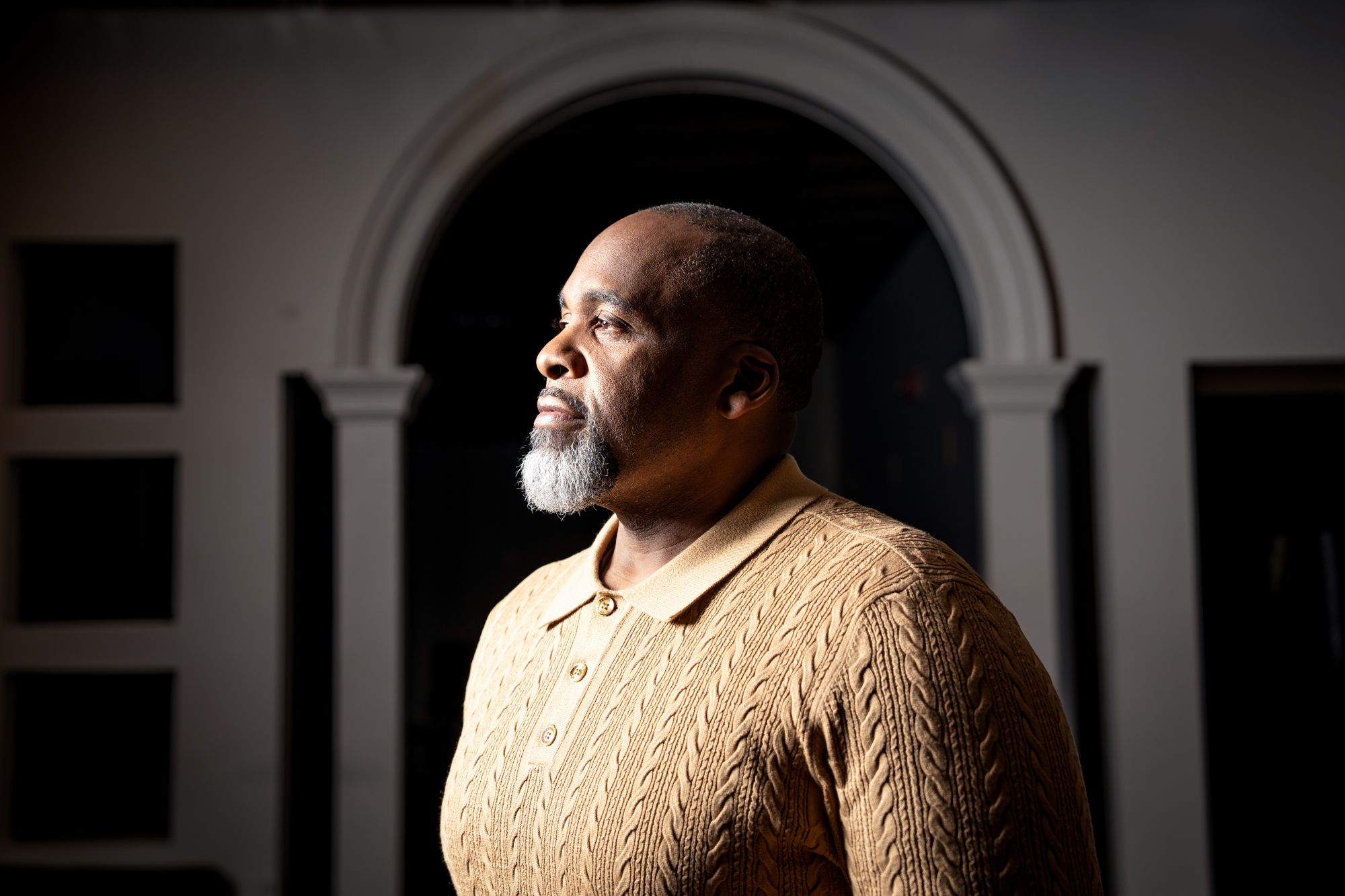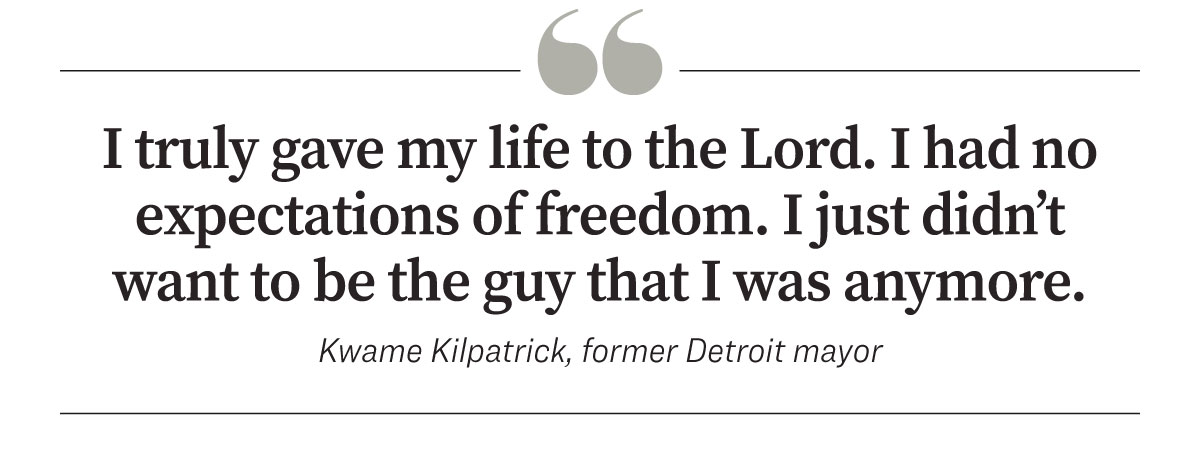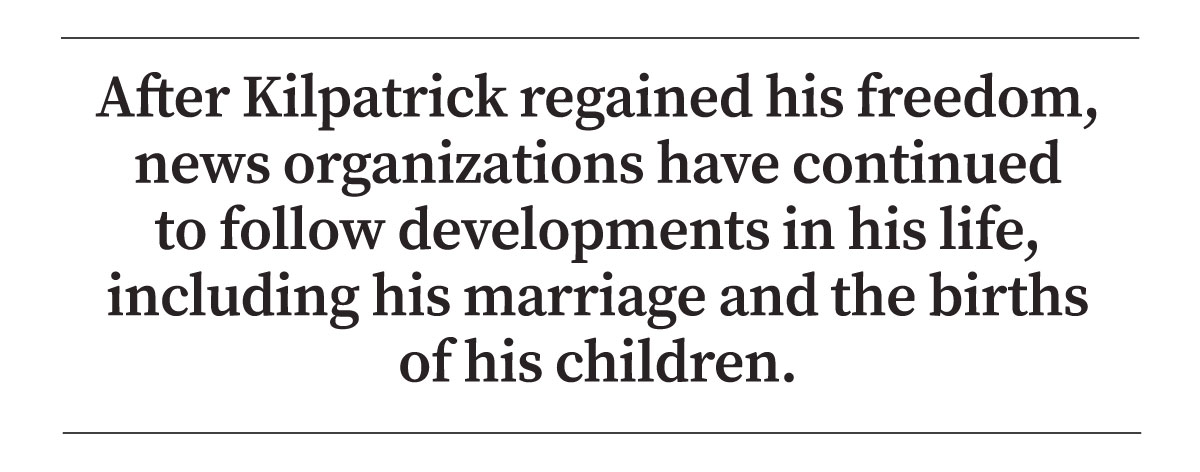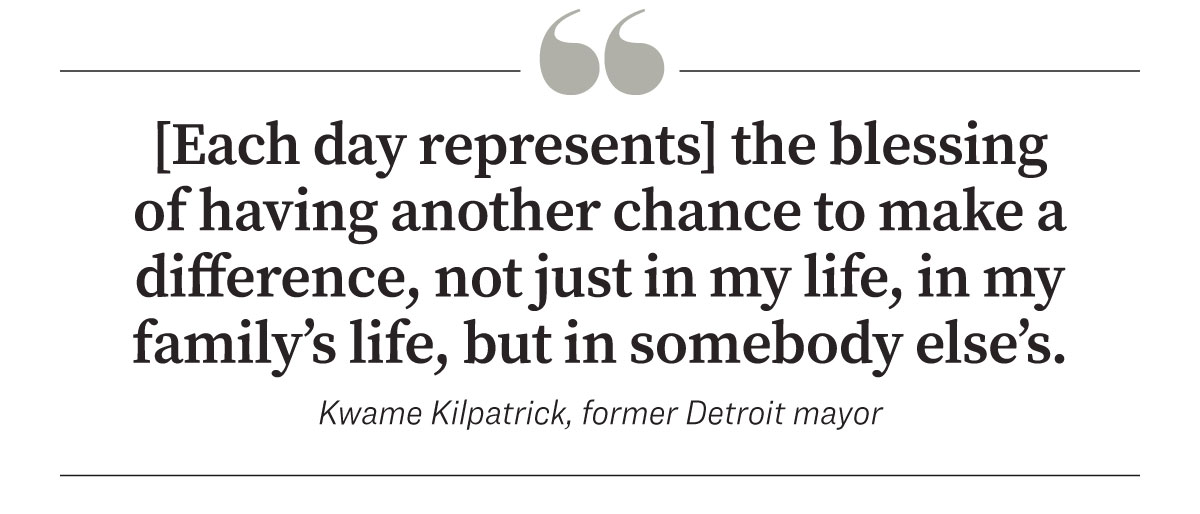NOVI, Mich.—A little more than four years ago, Kwame Kilpatrick—widely described as “Detroit’s disgraced former mayor”—was clinging to one small hope.
He had been convicted in a “pay-to-play” scandal that rocked the Motor City. It entangled more than 30 co-defendants including his father; the controversy cost Kilpatrick’s mother the congressional seat she had held for seven terms.
After exhausting every court appeal, he appeared doomed to fulfill the rest of his 28-year federal prison sentence—among the harshest a major public official had received in U.S. history.
Prosecutors said he “pervasively and systematically corrupted city government” throughout his six years as mayor; a jury convicted him of two dozen crimes including racketeering and fraud.
However, some people—even those who thought he was guilty—viewed his sentence as excessive. They didn’t think he deserved to be imprisoned a decade longer than many convicted killers in the United States serve.
In 2016, nearly 29,000 Kilpatrick supporters signed a petition seeking presidential clemency.
Regardless of any wrongdoing, Kilpatrick had brought new investments and optimism to a city suffering from the decline of its famed automobile industry, petitioners said; they were confident that, if released, he would harness his brilliant mind and communication talents to make amends in his hometown.
But President Barack Obama took no action for Kilpatrick, a fellow Democrat and early backer of Obama’s campaign to become the nation’s 44th president.
Clemency from the 45th president, a Republican who didn’t know Kilpatrick, seemed to be a longshot.
But 11 hours before President Donald Trump left office on Jan. 20, 2021, a Louisiana prison guard suddenly swung open the door of Kilpatrick’s cell and announced: “Man, you’re getting out of here.”
The guard displayed news articles confirming that Trump had commuted his remaining 20-year sentence.
After uttering, “Glory to God,” the 6-foot-4 prisoner crumbled to his knees. Sobs wracked his 275-pound body.
The “miracle” foretold to him had manifested, he said.
Four years later, Kilpatrick remains awestruck.
“Every day, I wake up and walk around, and I’m just like, ‘This is crazy, Lord,’” Kilpatrick, 54, said, marveling at his post-release life.
He is married to the former LaTicia McGee, 44, a woman who makes his face light up when he talks about her.

A wedding picture of former Detroit mayor Kwame Kilpatrick with his wife LaTicia Kilpatrick is displayed in their home in Novi, Mich., on Jan. 11, 2025. (Samira Bouaou/The Epoch Times)
They are raising a blended family of three children. He works as a political consultant, has launched a Christian ministry with his wife, and speaks out for criminal justice reform.
None of that would have materialized, he told The Epoch Times, if not for his spiritual transformation—and the intervention of those who believed in his redemption, particularly Trump.
“I believe that God definitely overwhelmed him and turned his heart towards me,” Kilpatrick said. “I don’t believe that there’s a person on Earth—besides my mom and dad—that has given more grace, mercy, and blessings to me through God ... than Donald Trump.”
In interviews with The Epoch Times, Kilpatrick, his wife, and others reflected on his journey from scandal to salvation, from imprisonment to freedom. They responded to skepticism over whether Kilpatrick’s metamorphosis is genuine.
The ex-mayor also described his political evolution, his post-prison interactions with Trump, and his hopes for the legacy he will leave in the city he was convicted of betraying.
Deserving Or Not?
Kilpatrick’s 2021 commutation, which had been kept quiet for a week, caused a stir. It also put Kilpatrick in rare company.From 2017 to 2021, Trump fielded 12,078 clemency requests, but granted only 238 of them—more than half on the final day of his first presidency, including Kilpatrick’s.
Such mercy for the ex-mayor was unwarranted, said Assistant U.S. Attorney Matthew Schneider. He denounced Kilpatrick as “a notorious and unrepentant criminal” in a statement after news of the commutation broke.
However, some of Kilpatrick’s supporters believe his protestations of innocence.
Others say that, even if Kilpatrick was guilty as prosecutors said, he has been punished enough; they see him as a changed man who is worthy of the second chance Trump granted.
Critics initially speculated that Kilpatrick’s freedom must have been bought—either with money or political promises.
Those are false suppositions, Kilpatrick said, adding that Trump made the decision “from his own will ... and this was something he didn’t have to do.”
At the time of Kilpatrick’s commutation, it was unclear whether Trump would run for office again after his much-disputed 2020 election loss.
Thus, Trump stood to gain nothing by granting clemency requests, Kilpatrick said.

The Kilpatrick family with former President Donald Trump in Macomb County, Mich., in October 2024. (Courtesy of Kwame Kilpatrick)
Grassroots Support Swelled
Largely unbeknownst to Kilpatrick, many people had been pleading his case to Trump and his inner circle.The White House announcement of Kilpatrick’s commutation cited support from 30 faith leaders and prominent Detroiters, including businessman Peter Karmanos Jr. He had long expressed concern over the handling of Kilpatrick’s case.
Other Kilpatrick advocates included influential Trump supporters such as Alveda King, niece of famed civil rights leader Dr. Martin Luther King Jr., and Lynette “Silk” Hardaway of the political commentator duo, “Diamond and Silk.”
Silk, in an email to The Epoch Times, said: “After reviewing the Kwame Kilpatrick case and after understanding how corrupted the government truly is, Diamond and I knew in our hearts that Mr. Kilpatrick was railroaded.”
“He may have broken the law, but 28 years in Federal prison for what many elite politicians have done and continue to do to this day appeared to be a malicious unjust persecution,” she said.
Alice Marie Johnson, a well-known crusader for criminal justice reform, told The Epoch Times she had no idea who Kilpatrick was when people started asking her to help him.
His name kept popping up in 2019, about a year after Trump commuted the life sentence that Johnson was serving.
Mandatory sentencing laws called for life without parole even for a nonviolent, first-time drug offender such as Johnson. She says she never sold—nor saw—a single drug. But she was convicted of crimes alleging she acted as a go-between for drug-trafficking messages.
At the time of her commutation in 2018, the 63-year-old great-grandmother had spent 21 years in prison.
Johnson’s release catapulted her into the national spotlight. Her story highlighted the need for The First Step Act, which lowered mandatory sentences for certain drug crimes such as Johnson’s. Trump signed it into law in December 2018.
In mid-2020, Trump extended a full pardon to Johnson for her justice-reform advocacy.
At Trump’s request, Johnson researched dozens of possible clemency cases. Her team included the president’s daughter, Ivanka Trump.
When Johnson would meet with Trump in the Oval Office, he grilled her about “every single case,” she said.
“He asked me, ‘Do you vouch for them? Tell me about their family’ ... I had to know it,” Johnson said.
Johnson said she learned from her own experience “that you have to pull back the layers of a case ... you can’t just go by what someone has written about a person.”

Alice Marie Johnson, who had her sentence commuted by President Donald Trump after serving 21 years in prison for cocaine trafficking, thanks the press during a celebration of the First Step Act in the East Room of the White House on April 1, 2019. (Chip Somodevilla/Getty Images)
Redeeming Qualities Seen
When she first checked into Kilpatrick, Johnson found plenty of “negative things” about him. After digging deeper, she concluded: “He definitely did not deserve a 28-year sentence.”People who had been incarcerated with him told her “how incredible he was in prison, mentoring the young men, how he turned his life around,” Johnson said.
She learned that Kilpatrick wrote clemency applications that freed three fellow prisoners.
In August 2020, Kilpatrick’s sister, Ayanna Kilpatrick, forwarded a letter from him to Johnson.
“It just hit me in the gut,” Johnson said. “I could read the genuineness in it.” She considered it to be a testimonial to “a true rehabilitation.”
In that letter, which Johnson shared with The Epoch Times, Kilpatrick thanked Johnson for standing up for justice and for him.
He shared concerns about the “depravity, destruction, and even death” that he witnessed behind prison walls. And he confessed: “I have made some very foolish decisions.”
As Johnson read about his work in prison ministry and education programs, “it reminded me so much of myself,” she said.
Johnson repeatedly urged Trump to free Kilpatrick. It was a hard sell. “People were really fighting against his release, in high places,” Johnson said, declining to elaborate.
In January 2021, as Trump’s first presidential term was running out, Johnson made a final push for Kilpatrick and other clemency applicants. “I gotta try one more time ... I gotta give it everything I got,” she told herself.
She implored Trump: “Please don’t leave these people behind.”
On Jan. 13, 2021, Trump signed Kilpatrick’s commutation, Johnson later learned.
In total, Trump granted just 26 of the 100-plus clemency requests that Johnson submitted. But about 20 more prisoners were set free under other early-release mechanisms, Johnson said.
“I just feel so proud and honored that I was able to help people get their lives back,” she said.
For Kilpatrick, the contrast between freedom and incarceration was particularly drastic.
He had spent a total of 225 days in solitary confinement, including the day he was freed. That was because COVID-19 rules required inmates to quarantine for 21 days before exiting the prison—and two expected release dates for Kilpatrick fell through.
When guards followed Trump’s order and let him out of his isolation cell, “I walked right out of the front door of the prison, with no shackles for the first time in almost eight years—and walked right to a Delta plane.”
He sat in the very last row, in the middle, “one that everybody calls, ‘the worst plane seat ever,’” he said. “I now know that was the best seat I’ve ever had in my life.”

Former Detroit mayor Kwame Kilpatrick at his home in Novi, Mich., on Jan. 11, 2025. (Samira Bouaou/The Epoch Times)
Rapid Rise and Fall
For a guy like Kilpatrick, landing behind bars was particularly hard to swallow.He had been “the golden child” who did the right things, he said. Unlike many of his peers, he didn’t do drugs and didn’t sell them.
He earned degrees from college and law school. He got married and had kids. He won election to the Michigan House of Representatives and proudly assumed the seat that his mother, Carolyn Cheeks-Kilpatrick, had vacated as she ascended to Congress.
He was a rising star in the Democratic National Committee who rubbed elbows with the rich, famous, and powerful.
Then, at age 31, he became the youngest mayor in Detroit history—the attainment of a childhood dream.
Six years later, everything came crashing down.
Early in his administration, he faced a budget crisis, allegations of flawed judgment, and relentless news coverage.
Even so, the charismatic young mayor won re-election in 2005. But midway through Kilpatrick’s second term, he suffered a knockout punch.
In 2008, news reporters unearthed years-old text messages proving that Kilpatrick and his chief of staff had an extramarital affair—which the pair had falsely denied in a 2007 civil case. Both were later imprisoned for lying under oath.
The Detroit Free Press was awarded a Pulitzer Prize for exposing the scandal—one that Kilpatrick doubts would cause as much fuss in today’s political climate.
As part of his plea deal, Kilpatrick resigned as mayor.

Detroit Mayor Kwame Kilpatrick greets President George W. Bush in 2005. In 2005, Kilpatrick was reelected to a second term as mayor. (Public Domain)
Denials and Realizations
He admitted guilt then and says he sees his wrongdoing even more clearly now.“I was terrible. Just bad. As a husband, as a cheater, as a betrayer, as a liar—I was all that,” he says, bluntly. “I was very stupid in office. I was very sinful in office.”
But Kilpatrick has never wavered from his assertion that he is innocent of the 2010 racketeering case that led to his lengthy federal prison sentence in 2013.
“I maintain I didn’t do any of those things that are in that case,” he said, “but I was a very flawed human being.”
Federal prosecutors cast him as “the leader of a criminal conspiracy.” They said he rigged bids, took bribes, and “schemed ... to cash in on his position as mayor.”
They also said the flashy, outspoken young politician lived a lavish lifestyle and betrayed the trust of the people who had elected him.
Kilpatrick countered that none of the charges alleged theft or embezzlement. He also alleges prosecutors turned him into a caricature, relied on witnesses who wanted to save their own skins, and exaggerated the harm the city suffered.
Kilpatrick also alleges that the charges were politically motivated.
More people are willing to consider such arguments now, he said, after seeing legal battles that Trump fought during his successful 2024 campaign.
Guilt-or-innocence debates aside, Kilpatrick said he wants people to see him for the man he is today.

Former Detroit Mayor Kwame Kilpatrick (C) appears in Wayne County Circuit Court for his sentencing in Detroit on Oct. 28, 2008. (Bill Pugliano/Getty Images)
‘A Sweet Brokenness’
A transformative moment came while he was incarcerated at El Reno, Oklahoma.Kilpatrick was stewing in his own juices. He had just lost an appeal. He was struggling with tattered family ties. And he was angry.
“I hated me; I hated everybody else,” he said.
Yet Kilpatrick said he couldn’t escape the truth: He was responsible for much of his own downfall. He surrendered to “a sweet brokenness,” he said.
On a whim, Kilpatrick signed up for a course at the prison chapel. After the first session, its instructor pulled Kilpatrick aside for a soul-searching talk.
And, on that date, June 9, 2014, “I truly gave my life to the Lord. I had no expectations of freedom,” Kilpatrick said. “I just didn’t want to be the guy that I was anymore.”
Although Kilpatrick had been raised as a Christian, he said his past spiritual life had been superficial at best; for him, his revelation in that prison chapel ushered in a rebirth.
Kilpatrick asked to work as the chapel’s janitor, so he could spend more time there. Often, he would remain in the chapel from 8 a.m. to 8 p.m., six days a week.
Besides cleaning, he would be “reading, watching, studying, teaching, counseling,” he says.
That pattern continued for more than four years. “It was like being in a seminary,” Kilpatrick said. He later delivered sermons at the chaplain’s request.
Kilpatrick acknowledged that many people roll their eyes when they hear claims of prisoners who “got religion” behind bars.
For some, declarations of new-found faith may serve as a façade, an escape, or a crutch, he said.
Others do make “a genuine conversion,” evidenced by their actions, he said.
“The Bible says, ‘By their fruit, you shall know them,’” Kilpatrick said. “That’s what I tell people.”

“Off the Grid” by former Detroit Mayor Kwame Kilpatrick is displayed in his home in Novi, Mich., on Jan. 11, 2025. (Samira Bouaou/The Epoch Times)
Seeds of Hope Planted
A woman whom Kilpatrick once called “Little LaTicia” had known him since her childhood. After he became mayor, he hired her as a receptionist.She would later become his wife. LaTicia Kilpatrick told The Epoch Times she had only a handful of conversations with him as mayor, but she disbelieved media portrayals of him.
“They made him appear to be like some ‘Scarface’ figure,” she said, referring to the motion-picture mobster with that nickname.
“I was like, ‘That’s not him’... I always felt like the heart of who he was could not fit the description of what they gave on the news.”
About three few years into Kilpatrick’s prison term, around 2016, she suddenly started having dreams that seemed to portend he would regain his freedom.
The young woman also felt moved to pray for him, and, eventually, to contact him, in 2018.
Over the phone, the pair developed a spiritual fellowship. Their dynamic changed when she boldly informed him that she was a grown woman and was no longer “Little LaTicia.” Personal visits followed.
This woman was among the people who helped Kilpatrick hang onto hope that he would be granted an early release. They believed it was God’s intention.
She fell in love with “the brightest beautiful mind,” and “the biggest heart that captured my soul while he was beautifully broken,” she said.
Six months after Kilpatrick regained his freedom, she married him. He divorced his first wife in 2018 while in prison, but has since repaired his relationship with three grown sons from that marriage.
Surrounded by his new wife and three children at his suburban Detroit home, Kilpatrick said, “When I put my feet on the side of the bed in the morning, it’s like a miracle day.”
He revels in “miracle moments”—including the day he finally met the man who freed him.

Former Detroit mayor Kwame Kilpatrick with his wife LaTicia and their children 1-year-old Kynsli, 14-year-old Lyathun, and 2-year-old Kyng, at their home in Novi, Mich., on Jan. 11, 2025. (Samira Bouaou/The Epoch Times)
Thank You, Mr. President
In January 2024, Kilpatrick went with other Michiganders to the Trump International Golf Club in West Palm Beach, Florida.Inside a restaurant there, Kilpatrick sat waiting for an hour before being summoned to the president’s table. “Mr. President, I’m Kwame Kilpatrick,” he said.
Immediately, Trump recognized his name. “Kwame Kilpatrick! Your pictures make you look like a little short guy,” Trump said. The two shared a laugh because Kilpatrick stands an inch taller than the 6-foot-3 president.
As Kilpatrick took a seat, Trump gave a rundown of Kilpatrick’s history for his other guests.
Kilpatrick was taken aback at how comprehensive Trump’s description was.
“He went through the whole thing,” ranging from his tenure as mayor to his prosecution, conviction, and release, Kilpatrick said. “I couldn’t believe he knew that much about me. It was refreshing.”
Then Trump, who was in the thick of his third presidential campaign, “turned around and said, ‘How do we win Michigan?’”
Trump’s let’s-get-down-to-business pivot made Kilpatrick crack up. He replied, “Well, first, Mr. President ... I need to thank you.”
Kilpatrick, who had already sent letters of gratitude to Trump, considered it an honor to say, face-to-face: “I need to let you know the impact of what you did.”
“I gave him the whole thing that was filling my heart,” Kilpatrick said. He told Trump that his clemency approval allowed him to build an entirely new life.
After showing pictures of his new wife and children to Trump, “he was like, ‘Wow, you’re busy,’” Kilpatrick said, chuckling at that lighthearted moment.

Kwame Kilpatrick, the former mayor of Detroit whose prison sentence President Donald Trump commuted, meets with Trump at the Mar-a-Lago Club and Resort in Palm Beach, Florida, in 2024. (Courtesy of Kwame Kilpatrick)
Impressive Knowledge
Then the pair started talking politics. “I was so impressed with how intuitive he was, with how much he knew, with the information that he had. It blew me away,” Kilpatrick said.Trump’s in-person presence differed from the image projected on TV; he was savvier than Kilpatrick had perceived.
“I knew he had to be smart because of his business sense, but it was amazing to see just how well-read he was—not just in general, but on Michigan,” Kilpatrick said.
“He really understood the political atmosphere and environment of the state of Michigan, and I thought that that was awesome.”
In response to Trump’s queries about the Great Lakes State, Kilpatrick offered additional insights.
He told Trump that “people were really not as happy with the Democratic Party as he perceived, and that there was an opportunity, particularly with black men.”
After that exchange, Trump invited Kilpatrick to stay overnight and meet with him again the next day. The two men gathered with some of Trump’s political advisers at the nearby Mar-a-Lago Club and Resort, which Trump owns and calls home.
Kilpatrick declined to divulge details, out of respect for Trump’s hospitality and confidential campaign strategies.
Bible Verse Invoked
He and Trump also shared a spiritual moment.While in prison, Kilpatrick dreamt that he had met with Trump in the Oval Office; as Trump discussed politics, Kilpatrick pulled out a Bible and read a verse to him.
At Mar-a-Lago, the dream came to Kilpatrick’s mind. Hesitantly, he told Trump about it.
He summarized for Trump the Bible passage from his dream: Jesus goes into a temple, overturns tables of money-changers, and drives them out—a contrast to the passive image that people associate with Jesus.
Kilpatrick told Trump: “You know, there are a lot of people, probably including you, Mr. President, who thought Jesus was kind of not like you and your personality. But I wanted to show you a side of Him that is like you.”
That biblical story shows disruption is sometimes needed, he said.
Kilpatrick concluded by telling Trump: “You’ve come to restore the White House to what it was intended for. You’re going to win, and you’re going to do that.”

President Donald Trump departs the White House in Washington on Feb. 14, 2025. (Madalina Vasiliu/The Epoch Times)
A Political Shift
A few months later, Kilpatrick announced his endorsement of Trump. He also campaigned on Trump’s behalf, saying that Trump’s experience and boldness made him the best-qualified candidate for the presidency.Some media reports emphasized that Kilpatrick was a “convicted felon” supporting Trump, who also had been convicted of crimes in a controversial New York business records case.
But many people in Trump’s Make America Great Again movement welcomed support from Kilpatrick, hoping it would boost Trump’s vote totals in the election; Trump did win Michigan in the 2024 election, after losing the state in 2020.
At Trump’s Election Night watch party in Palm Beach, Florida, Kilpatrick told The Epoch Times that he was a “defector” from the Democratic Party despite strong family ties to it.
But stepping away “wasn’t that tough for me because I was always a little more conservative than the rest of my family,” said Kilpatrick, who identifies as an independent now.
Besides, his parents raised him “to be free-thinking, to be strong and not be weak, to say what you mean and mean what you say.”
Kilpatrick decided to support Trump because he had “morphed into this kind of Republican, kind of conservative Democrat, but also this truth teller,” Kilpatrick said.
Meanwhile, the Democratic Party moved away from policies Kilpatrick believes in.
While Trump has focused on entrepreneurship and self-reliance, the Democratic Party “talks about programs—you know, ‘Let’s get some more free lunches and free breakfasts,’” Kilpatrick said.
“I come from a school of people that say: ‘If you help me get access to capital and help me grow my business, I’ll buy my own lunch and breakfast.'”
After Trump won last year’s election, Kilpatrick and his wife were invited to watch Trump’s inauguration from reserved seats at the Capitol. But plans changed after cold weather pushed the event indoors.
Still, Kilpatrick felt blessed to see Trump take the oath of office on TV, “watching this great transition of the world, and knowing that you had something to do with that moment ... and to be on the right side of history, I believe.”
At the president’s invitation, Kilpatrick attended a White House reception honoring Black History Month on Feb. 20. He brought his wife’s son, whom he calls his “new son,” Lyathun Bolden, 14, to the event and introduced him to the president; Trump posed for a photo with the teen.
Kilpatrick said he will be “a friend of this administration,” but he is mostly focused on moving forward with his new life near his old stomping grounds.

Kwame Kilpatrick and his wife, LaTicia Kilpatrick, pose for a photo at the Liberty Ball at the Walter E. Washington Convention Center, one of three official balls celebrating President Donald Trump’s second inauguration, in Washington on Jan. 20, 2025. (Courtesy of Kwame Kilpatrick)
Kilpatrick and His ‘Peeps’
On a chilly, partly cloudy Friday afternoon in January, Kilpatrick sat down with The Epoch Times at the historic St. Regis Hotel just north of downtown Detroit.People passing through the hotel greeted him with broad smiles, hugs, and “wassup?” These are his “peeps,” and he loves being around them.
In and near downtown, where many people know him personally, Kilpatrick tends to get warm welcomes, he said. But in some suburbs, he’s still a pariah, especially to people who have never met him.
One man at the hotel, entertainment-industry producer Mike Eckstein, paused to speak to The Epoch Times about Kilpatrick, whom he has known for years.
In 2003, Kilpatrick participated in the National Hip-Hop Summit in Detroit, giving him the nickname, “the Hip-Hop Mayor.” He hung out with rap music artists and gained interest from many young Detroiters as a result, Eckstein said.
Because of Kilpatrick’s downfall, “people were kind of skeptical” about him when he was first released from prison in 2021, Eckstein said.
But attitudes have softened since then: “The majority of people are happy to see him, are happy with what he’s doing, happy that he got pardoned, happy that he’s back.”
And, Eckstein said, they’re “happy that he’s happy.”
Kilpatrick is the kind of guy who “lights up a room,” Eckstein said, and “people gravitate to him just as they did before he was in prison.”

Former Detroit mayor Kwame Kilpatrick (R) with Mike Eckstein, an entertainment-industry producer, in Detroit on Jan. 10, 2025. (Samira Bouaou/The Epoch Times)
‘Humility’ Supplants ‘Arrogance’
RaShonn Young, 58, a lifelong Detroiter, remembers Kilpatrick and his scandals well, but hadn’t met him until he got out of prison.She recalls that, within a year of his release, he showed up at the suburban church where she and her husband are associate pastors.
When she saw him, one word came to mind: “Humility.” That’s opposite of “arrogance,” a label that many of Kilpatrick’s critics used to describe him when he was mayor.
But Young told The Epoch Times: “I could tell he was a changed man. I saw humility, and I still see that today. And you can see the difference, even just having a basic conversation with him ... his demeanor, his personality, all of that.”
While naysayers doubt Kilpatrick’s authenticity and dismiss his public preaching as “playing minister,” Young said she has been deeply touched when listening to his sermons.
Late last year, when her father-in-law passed away, Kilpatrick agreed to deliver the eulogy. “He blessed us so much on that day, and just really encouraged my husband,” Young said.
She also described a powerful experience she had at a “Soulful Saturday” service that Kilpatrick held at a local library.
Young arrived a few minutes late, so he was already teaching. As she took her seat, “I just literally felt the presence of the Lord, so strong and heavy. I felt that the entire time until he actually stopped preaching.”
An associate pastor for 25 years, Young said she can tell that Kilpatrick has studied the Bible intently. He projects knowledge of Scripture, along with an “openness” to continue learning, “with that humility,” she said.
Asked about her hopes for him, Young said, “I can see he’s definitely on the right track.”
As for whether Detroit seems ready to embrace Kwame Kilpatrick 2.0 and move beyond his past, Young said: “I’m sure there are people that are still holding onto what has happened, and probably will never forget.”
Young encourages such people to reconsider. Many people don’t see their foibles put on widespread display, as Kilpatrick and other public figures do. With that in mind, perhaps people will be less judgmental, she said.

Former Detroit mayor Kwame Kilpatrick plays with his daughter Kynsli at home in Novi, Mich., on Jan. 11, 2025. (Samira Bouaou/The Epoch Times)
‘The Donald Trump of Detroit’
News accounts have often referred to Kilpatrick as a “polarizing” figure—a term frequently used to describe Trump.“I was ‘the Donald Trump of Detroit’—you know, the guy that you love to hate,” Kilpatrick said.
During his time as mayor, news reporters hounded him, he said, seemingly holding him responsible for “everything that ever happened in the city.”
A newspaper editor once confessed: “We got to keep you on the front page ... you sell papers,” Kilpatrick said. “At least he was honest.”
Trump, who has famously complained about “fake news,” is exposing people in news media and the criminal justice system who are “not seeking truth, not seeking justice, but seeking to hurt,” Kilpatrick said.
After Kilpatrick regained his freedom, news organizations have continued to follow developments in his life, including his marriage and the births of his children.
Controversies about his court-ordered restitution also made headlines recently. Trump’s commutation left that order—and Kilpatrick’s felony record—unchanged.
After Kilpatrick’s conviction in 2013, prosecutors sought a total of $9.6 million from him and a co-defendant. Courts repeatedly cut the amount, records show, as Kilpatrick pressed for justification.
By late 2023, the outstanding balance was about $165,000, a Justice Department document says. Since then, Kilpatrick said he has paid about $9,000, reducing the balance to around $156,000.
“I’ll pay whatever I owe,” he said, but he is still seeking calculations proving “actual losses.”
“I’m asking one question: ‘Why do I owe this?’”

Members of the media and the general public wait outside the Wayne Couny Jail after Detroit Mayor Kwame Kilpatrick was jailed in Detroit on Aug. 7, 2008. (Bill Pugliano/Getty Images)
Words Versus Actions
Looking back on his time as mayor, Kilpatrick believes he had plenty of achievements, not just scandals.People who filed his clemency petition agree. “Kwame galvanized the City of Detroit. He gave the city hope again ... and he truly did make a positive impact,” they wrote.
“He took the [helm] of a sinking ship and did a better job than anyone could have expected,” the petition said.
Kilpatrick said the controversies do not negate his accomplishments, which include jump-starting projects that continued after he left office.
In the heart of downtown Detroit, Campus Martius Park was created in 2003, Kilpatrick’s second year in office.
It’s now “a Detroit treasure and a national and international destination,” the Downtown Detroit Partnership’s website says, noting that USA Today named it the No. 1 public square in the United States two years in a row.
Seven new hotels were built in the city within five years, after years-long stagnation, Kilpatrick said.
He also is proud of his role in hosting major sporting events in Detroit, including Major League Baseball’s All-Star Game in 2005, and the National Football League’s Super Bowl XL in 2006.

The Spirit of Detroit monument dons a No. 1 Detroit Lions jersey, in front of the Coleman A. Young Municipal Center, where the mayor's office is located, in Detroit on Jan. 9, 2025. (Samira Bouaou/The Epoch Times)
For Detroiters, that Super Bowl was particularly meaningful because Pittsburgh Steelers running back Jerome “The Bus” Bettis, announced his retirement after his team won the championship in his hometown.
Beforehand, Kilpatrick had presented “the key to the city” to Bettis.
Kilpatrick was known for being relatable and approachable as mayor, and he says many people still appreciate him for that.
He said that aligns with a quote that has been attributed to the poet, Maya Angelou: “People will forget what you said, people will forget what you did, but people will never forget how you made them feel.”
“I believe, for Detroiters, they felt connected to government” under his leadership, Kilpatrick said.
But many people were outraged over Kilpatrick’s mayoral tenure—so much that voters resoundingly approved an amendment to the Michigan constitution because of it.
Passed in 2010, that amendment forbids certain felons from holding state or local elected office for 20 years post-conviction.
Kilpatrick acknowledged that, among some of the citizenry, resentment lingers.
But he isn’t focused on that. Each day represents “the blessing of having another chance to make a difference, not just in my life, in my family’s life, but in somebody else’s,” he said.
“So, whatever I’ve done to hurt anybody, whatever I’ve done to disappoint anybody, I’ve apologized 7 million times—because I wear that,” Kilpatrick said.
“It’s not about what I say, it’s about how I live now. And if people don’t believe me, that’s okay. Time will tell.”
























